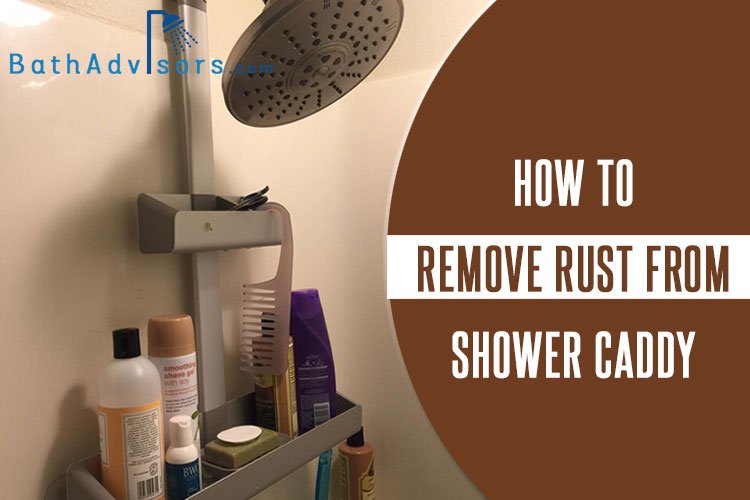Do you feel like you’re fighting a losing battle against hard water stains in your bathtub? These unsightly marks can be a real pain to remove, and the worst part is these dull and dingy stains can become permanent if you don’t apply appropriate measures.
So how to remove hard water stains from the bathtub?
Mix equal parts of vinegar and baking soda to make a thick paste and apply it on the stained areas. Leave it for 15 minutes and rinse the tub with plain water. Alternatively, you can use a water and vinegar mixture, spray it on the stains, and rinse them off after 5-10 minutes.

Read on to learn more about what causes these hard water stains and how to keep your tub sparkling clean.
Importance of Removing Hard Water Stains from Bathtubs
Besides affecting the aesthetics of your bathtub, hard water stains have multiple disadvantages. Thus, it’s crucial to remove them at the earliest opportunity.
Here are some reasons explained:
They Damage the Tub’s Surface
If hard water stains are allowed to sit on the tub for a long time, they can damage its surface. The surface’s soft, plain, bright finish eventually gets dull and faded and no longer looks promising. Effectively cleaning these stains helps you extend the lifespan of the bathtub while avoiding expensive repairs.
Stubborn Stains Impact the Tub’s Aesthetics
Hard water stains can make a bathtub look dirty and unappealing, even if it’s otherwise clean. Removing these stains can help restore the bathtub’s appearance while amping up the bathroom’s overall look.
Hard Water Stains Devastate Your Hygiene
Long-time accumulation of hard water stains can harbor bacteria and other germs. A study found that hard water scaling is a common cause of bacterial growth in water which may cause issues like irritated or itchy skin. And continued exposure to hard water stains can cause eczema, which may worsen over time.
They Affect Your House’s Resale Value
If you plan to sell your home in the future, having a clean and well-maintained bathtub can increase the resale value. Hard water stains can make a tub look old and worn, turning off potential buyers.
Why Does Hard Water Leave Stains in Bathtubs? 3 Common Causes
The reason hard water leaves stains on your bathtub lies in the chemistry of the minerals in the water and how they interact with the tub’s surface. Here are some common causes you see unsightly stains on your tub despite cleaning it several times.
Mineral Buildup
When hard water is left to dry on a bathtub’s surface, the minerals in the water can begin to accumulate, forming a hard, crusty buildup. When this buildup piles up for a long time, it may leave behind whitish or brownish spots known as hard water stains.
Hard Water Forms Insoluble Compounds with Soap
The minerals in hard water can react with the soap or detergent used to clean the bathtub, forming insoluble compounds that are difficult to remove. For example, calcium ions in hard water can react with soap to form calcium stearate, which is a sticky, soap-scum-like substance that can accumulate on the surface of the bathtub.
Hot Water Makes Things Worse
I’m sure you enjoy having a long hot bath in the bathtub, but did you know heated hard water is one of the prime causes of hard water stains? Hot hard water causes minerals to bond together and form a hard, chalky substance known as limescale, similar to the ones you’ve probably seen inside your water heater tanks.
How to Get Hard Water Stains Off a Bathtub- Step-by-step
I have dealt with the issue of hard water stains for many years and have tried several cleaning measures to eliminate them. Below I’ve compiled some steps that helped me make my tub squeaky clean in one go.
Step 1: Gather Supplies
You will need a few supplies to effectively remove hard water stains from your bathtub. Gather white vinegar, baking soda, a spray bottle, a soft-bristled scrub brush or sponge, and a microfiber cloth in one place. Be sure to have everything you need on hand before you start.
Step 2: Prepare a Vinegar Solution
In a spray bottle, mix equal parts of water and white vinegar. Shake the bottle well to combine the ingredients thoroughly. The vinegar will help to break down the mineral buildup that has caused the hard water stains.
Step 3: Spray the Vinegar Solution and Let it Sit for Some Time
Spray the vinegar solution generously over the hard water stains in your bathtub. Make sure to cover the entire stained area. Allow the solution to sit on the stains for 15-20 minutes.
This will give the vinegar enough time to break down the minerals that have caused the hard water stains. You can also leave it on longer if the stains are particularly stubborn.
Step 4: Scrub the Stains
Use a soft-bristled scrub brush or sponge to gently scrub the stained area. For stubborn stains, sprinkle baking soda on top of the vinegar solution before scrubbing. Baking soda is a mild abrasive and can help remove hard water stains from plastic bathtubs.
Step 5: Rinse and Dry the Bathtub
Rinse the bathtub thoroughly with clean water to remove all of the vinegar solution and baking soda residue. Make sure to rinse the entire bathtub, including the corners and edges.
Next, use a microfiber cloth to dry the bathtub completely. Drying the bathtub after cleaning helps prevent hard water stains from forming.
Tips for Removing Hard Water Stains from Bathtub
After cleaning those stubborn stains, you’ll agree it’s a task at its best. Therefore, it’s better to adopt preventive measures to minimize the accumulation of hard water stains in the first place.
Here are some tips that I found effective in preventing stains-
Dry the Tub After Every Bath
Use a dry towel or squeegee to dry out the bathtub after each use. Drying out the water won’t leave scope for mineral buildup; hence, no stains.
Install a Water Softener
A water softener will reduce the number of minerals in hard water and prevent hard water stains in the bathtub. Or you can use a shower filter to remove excess minerals from water that are causing hard water stains.
Use a Bathtub Mat
A bathtub mat creates a barrier between the mineral buildup and the tub; therefore, using one can be extremely useful to prevent hard water spots from damaging your tub’s look.
Deep Clean Your Bathtub Regularly
Cleaning the tub regularly prevents sturdier stain formation. If hard water is a prevailing problem in your area, clean your bathtub or bathroom in general at least once every week. You can use vinegar and water to stop stains from sitting in the bathtub.
Best Cleaners to Remove Hard Water Stains From A Bathtub: Top 3 Options
Hard water stains can be stubborn and difficult to remove from bathtubs, but you can use several effective cleaners to tackle the problem. Here are the best hard water stain removers you can use to restore your tub’s finish.
Baking Soda and Hydrogen Peroxide
A mixture of baking soda and hydrogen peroxide is a sure-shot solution to hard water stains. Mix the two to create a paste, then apply it to the stains and let it sit for 30 minutes. Scrub with a sponge or brush and rinse with water.
Borax
Borax is a safe natural mineral that can effectively remove hard water stains. Mix 1/4 cup of borax with 1/4 cup of lemon juice to create a paste, then apply it to the stains. Let Borax do its wonder for at least 30 minutes, scrub the tub gently, and rinse it with plain water.
Commercial cleaners
There are several commercial cleaners designed specifically for removing hard water stains. Look for products containing citric acid or oxalic acid that are effective for breaking down mineral deposits. Follow the manufacturer’s instructions for use to protect the tub from damage.
FAQs
Q: Are Hard Water Stains Permanent?
A: Hard water stains can be tough to remove from a bathtub but are not necessarily permanent. You can easily remove them by using appropriate measures to make your tub squeaky clean.
Q: Can I Use Bleach to Remove Hard Water Stains from a Bathtub?
A: Yes, you can use bleach to remove hard water stains. However, prevent using bleach directly on the surface. It’s better to dilute it with some water to avoid damaging the tub’s surface.
Q: How Often Should I Clean my Bathtub to Prevent Hard Water Stains?
A: It’s best to clean your bathtub at least once a week to prevent the formation of hard water stains. Use a good-quality tub cleaner suitable for the surface that doesn’t make your bathroom smelly.
Final Thoughts
Even though hard water stains are quite frustrating to deal with and can affect the look of your bathtub, you can remove them using the methods explained in this article. The best way to keep these stubborn stains away is to clean your bathtub regularly.
A baking soda and vinegar solution is the best cleaner for hard water stains in the bathtub, keep the paste ready in a container, and use it every week to clean the tub.






